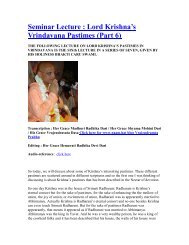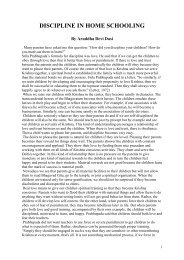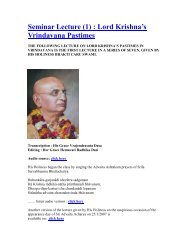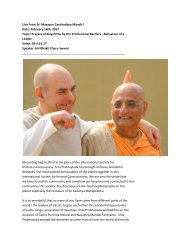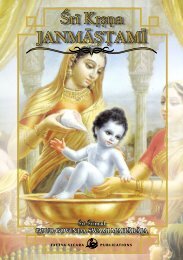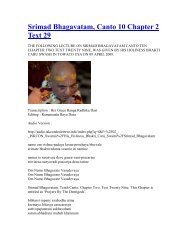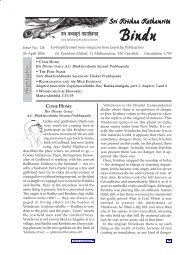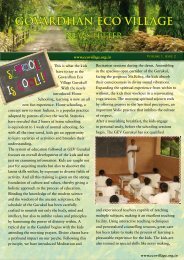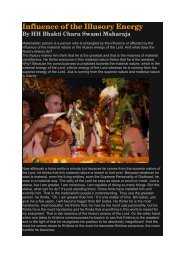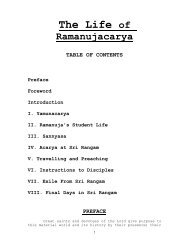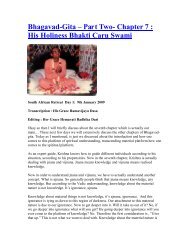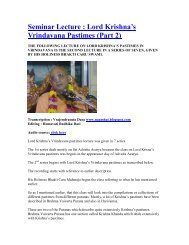Madhusudan Masa - The Eight Petals - ebooks - ISKCON desire tree
Madhusudan Masa - The Eight Petals - ebooks - ISKCON desire tree
Madhusudan Masa - The Eight Petals - ebooks - ISKCON desire tree
You also want an ePaper? Increase the reach of your titles
YUMPU automatically turns print PDFs into web optimized ePapers that Google loves.
<strong>Madhusudan</strong> Mas<br />
Volume: 02<br />
Issue: May’10 – June’10<br />
practically all householders kept at least one cow, generally quite a few cows. Land and cows cannot<br />
be separated in as much as brahmanas and cows also cannot be separated.<br />
Distribute Sanctified Food<br />
<strong>The</strong> Vedic maxim is “Produce only what you need” and “Use only what you produce”. <strong>The</strong>se are<br />
profound statements which, if properly understood and applied, can simplify immensely how one is<br />
meant to live. Food is meant to be widely distributed. <strong>The</strong> Vedic literatures enjoin that householders<br />
call out three times to any hungry person before partaking of food themselves. Householders have a<br />
specific responsibility towards food in that they are duty bound to supply food to 1) the saintly<br />
persons, 2) the general public, 3) the forefathers, and 4) to themselves.<br />
Conclusion<br />
Government reports show that the production of rice during the pre-colonial days of India was 10<br />
times the present production. <strong>The</strong> number of pure breeds of cows exceeded 100 while today we find<br />
only 33. When the respect for land and cows was prevailing, real opulence and social stability<br />
naturally follows. <strong>The</strong> overpopulation problem is but a myth. Nature can produce 10 times more food<br />
than today’s output if simply there is proper management of resources.<br />
Unless today’s leaders and people in general come to understand and accept the clearly defined plan of<br />
mother nature where production of food is meant to be local and such food offered in sacrifice to the<br />
Lord, no amount of adjustments will bring any solution to the present threatening global crisis. Ecovillages<br />
can help bring about such changes if people are properly educated and trained in the basic<br />
principles of Krishna consciousness. Knowledge of the proper standards and norms of nature is<br />
therefore needed to bring about the required changes in society. Saving our cows and saving our<br />
villages form the basis for re-directing today’s misguided society. Making Vrindavana Villages through<br />
programs such as ‘Adopt a Village program’ will help bring stability to today’s troubled society. Those<br />
interested to help in this endeavour may join the established groups called Varnasrama Research<br />
Teams. One can get more information by visiting www.varnasrama.org.<br />
- HH Bhakti Raghava Swami<br />
Standard Devotee Diet<br />
Srila Prabhupada recommended a standard diet for the devotees, and instructed that all of the temples should<br />
follow it every day. That menu is as follows:<br />
BREAKFAST:<br />
Simple farina cereal with nuts and raisins<br />
Milk (steaming hot), or yogurt in the summertime<br />
Chick peas (raw, soaked overnight)<br />
Ginger root (raw)<br />
Oranges, apples and/or bananas<br />
LUNCH:<br />
Rice<br />
Chapatis<br />
Dal made with freshly ground ginger root and freshly ground spices<br />
Subji made with ghee, freshly ground ginger root and freshly ground spices<br />
BEFORE TAKING REST:<br />
Milk (steaming hot)<br />
Bananas<br />
Make Vrndavan Villages



